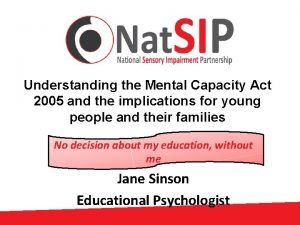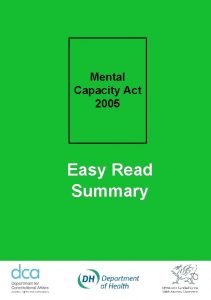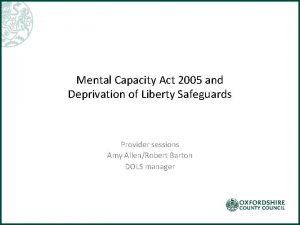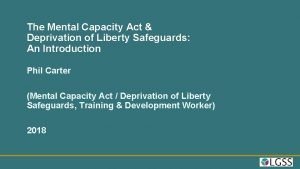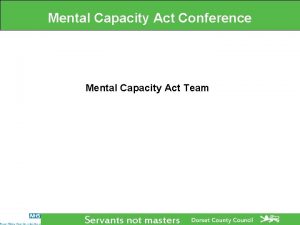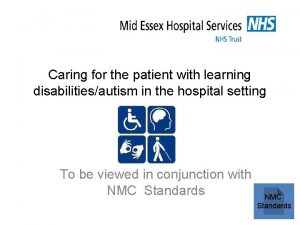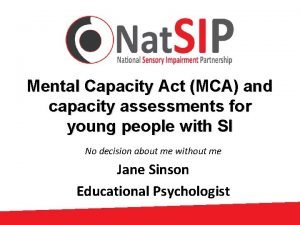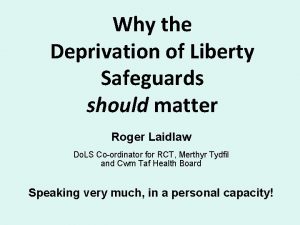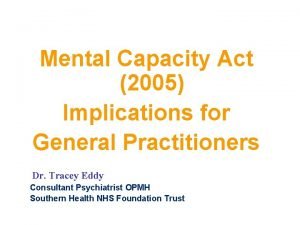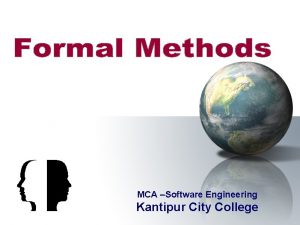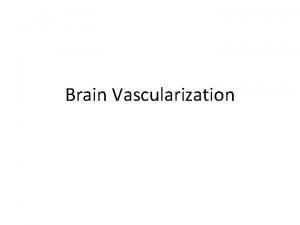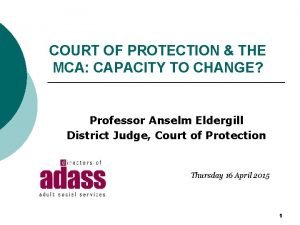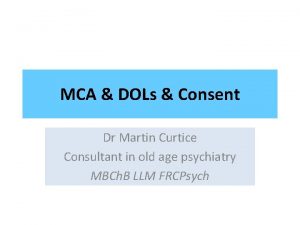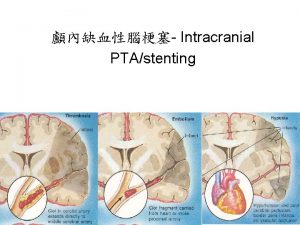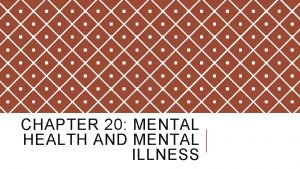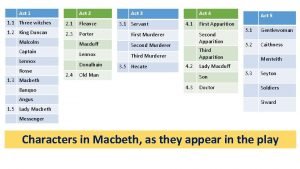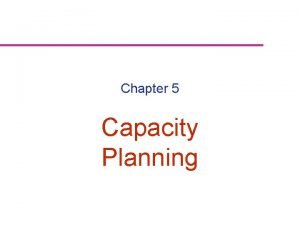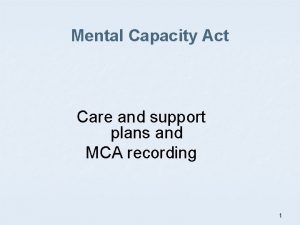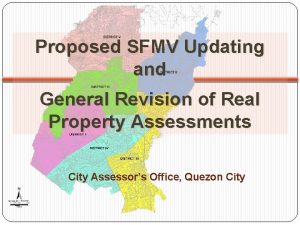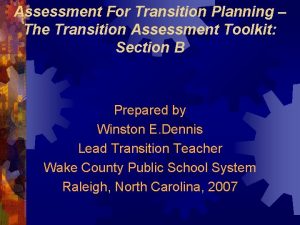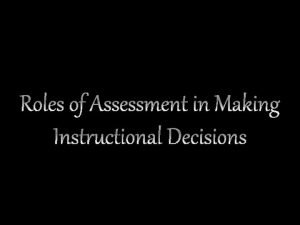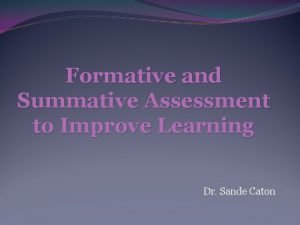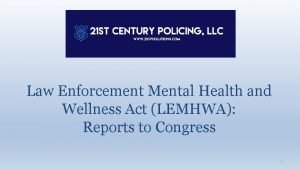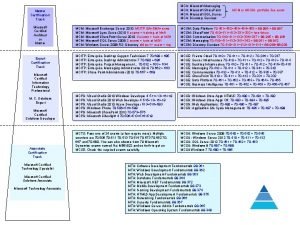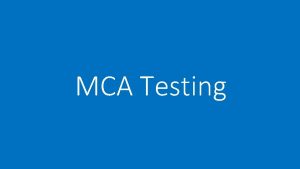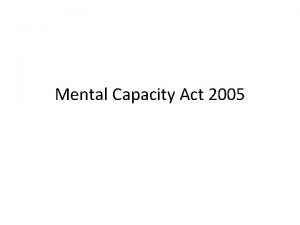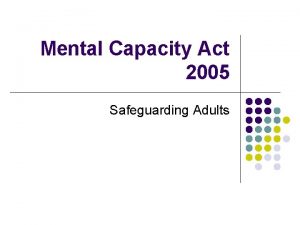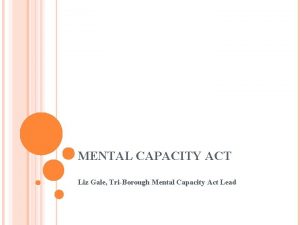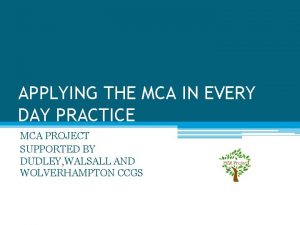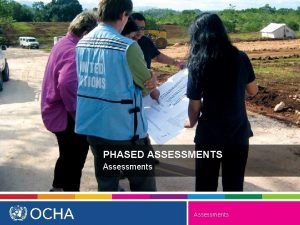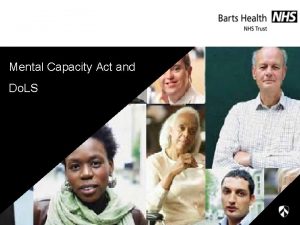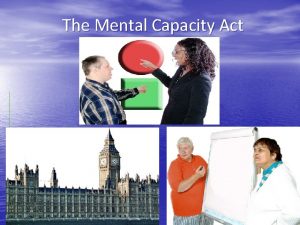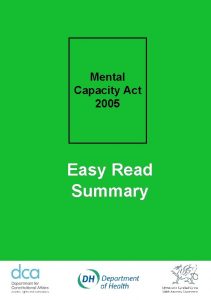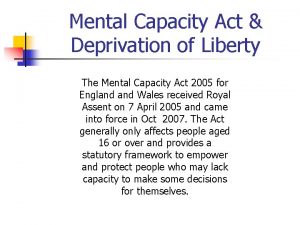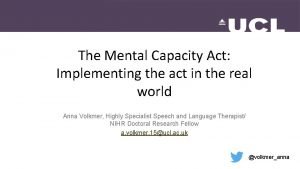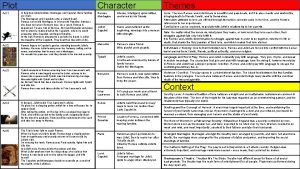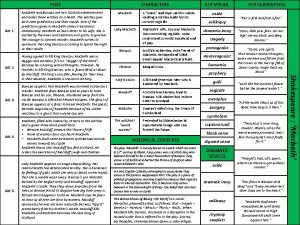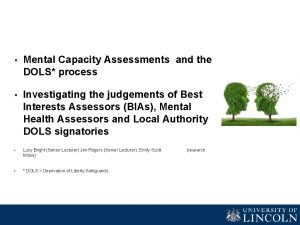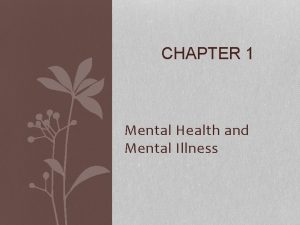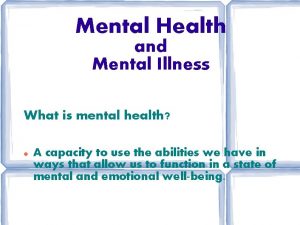Mental Capacity Act MCA and capacity assessments for






































- Slides: 38

Mental Capacity Act (MCA) and capacity assessments for young people with SI No decision about me without me Jane Sinson Educational Psychologist

Mental capacity • Mental capacity is the ability to make a decision (MCA COP 4. 1) • Ability to make a decision that affects daily life • Ability to make decisions that are more significant e. g. where to continue education • Ability to make a decision that may have legal consequences e. g. to appeal to the tribunal

Mental Capacity Act 2005 o Enacted 2007 o Provides a statutory framework for people who lack capacity to make decisions for themselves from the age of 16 years o But it is assumed everyone can make their own decisions unless it is proved otherwise (presumption of capacity)

Mental Capacity Act 2005 o Supported by a Code of Practice (COP). Focus was mainly health and social care professionals published by the Dept. of Health o Residential special schools only need to be aware that 2009 introduced the Deprivation of Liberty Safeguards

5 Key Principles of the Act: 1. It should be assumed everyone can make their own decisions unless proved otherwise 2. A person should have all the help and support possible to make and communicate their decision before anyone concludes that they lack capacity to make their own decision

5 Key Principles of the Act: 3. A person should not be treated as lacking capacity just because they make an unwise decision 4. Actions and decisions carried out on behalf of someone who lacks capacity must be in their best interests 5. Actions or decisions carried out on behalf of someone who lacks capacity should limit their rights and freedom of action as little as possible

Mental Capacity Act Code of Practice An adult: • attorney under Lasting Power of Attorney • deputy appointed by the Court of Protection • acting as an Independent Mental Capacity Advocate • acting in a professional capacity for, or in relation to a person who lacks capacity • being paid for acts for or in relation to a person who lacks capacity

Mental Capacity Act Code of Practice o Professionals o Variety of healthcare (doctors, nurses, therapists, dentists, radiologists, paramedics) o Social care staff o Others who occasionally may be involved in the care of people who lack capacity such as housing workers or police offices

Mental Capacity Act Code of Practice From 1 st September 2014 Education professionals have to have regard to the SEN Code of Practice & MCA Code of Practice

Why is it now in education? o Children and Families Act 2014 and new SEN Code introduces a clearer focus on the participation of young people in decision making o The MCA gives young people the right from the age of 16 years to participate in decision- making about things that affect them o Education has been out of line with health and social care in relation to young people’s formal participation in decision making

Why is it now in education? o Extension of the age of participation in education for young people with SEN to 25 years old o The raising of the participation in education for all young people to 18 years from summer 2015 o At 18 years old young people become adults and are covered by all adult legislation and guidance

What does this mean for young people? 16 -17: 11 months old Children Acts 1989 & 2004 Equality Act 2010 United Nations Convention on the Rights of the Children & Families Act 2014 Mental Capacity Act 2005 Ofsted/Court of Protection guidance (residential special school

What does this mean for young people? 16 years – 17 years 11 months Health 16 years Education end of Y 11 SEN Code of Practice 8. 15 after the end of Y 11 young people can make decisions directly.

What does this mean for young people? 18 – 25 years old Equality Act 2010 All adult legislation e. g. safeguarding Children & Families Act 2014 Mental Capacity Act 2005 Ofsted/Court of Protection guidance (residential special school

16 – 25 years olds No decision about me without me K

Mental capacity • Mental capacity is the ability to make a decision (MCA COP 4. 1) • Ability to make a decision that affects daily life • Ability to make decisions that are more significant e. g. where to continue education • Ability to make a decision that may have legal consequences e. g. to appeal to the tribunal

Mental capacity: activity How did you decide on where you went for your last holiday? Briefly write down the process you went through

Mental capacity. Key elements of decision making are: - Information: • what information? • in what format ?

Mental capacity. Key elements of decision Remembering information Weighing up the pros and cons Communicating your decision

Mental capacity: activity What decisions will young people aged 16 – 25 years need to make in relation to their education? Are there specific decisions relating to sensory impairment?

Mental capacity: activity In relation to the decision about educational placement, which of these young people may need to have their capacity to make this decision assessed? Why?

Mental capacity: activity Rosie is 16 years old Where does she wish to attend for her post 16 education? Rosie is 18 years old Where does she wish to attend for her post 18 education?

Capacity Assessments • MCA Code of Practice Chapter 4 sets out capacity assessments • 2 stage process – Stage 1: to determine if an assessment is needed for this decision – Stage 2: the assessment using the 4 key questions • Language used is not the way a young person’s functioning is described in education

Capacity Assessments: MCA COP sections 4. 10 - 4. 13 • Stage 1: this has 2 steps • Step 1 step 1 Does the person have an impairment of, or a disturbance in the functioning of, their mind or brain? Does the young person have a learning difficulty or difficulties with their emotional well-being or mental health issues?

Capacity Assessments: MCA COP sections 4. 10 - 4. 13 • Stage 1: this has 2 steps Step 2 • Step 2 Does the impairment or disturbance mean that the person is unable to make a specific decision when they need to? Does the young person’s learning difficulty or emotional well-being difficulties or mental health issues affect their ability to make this decision when they need to?

Capacity Assessments YES NO YES Young person has capacity YES Capacity assessment is needed

Capacity Assessments: activity What are the qualities the assessor should have?

Capacity Assessments The assessor needs: • no formal qualifications • to know the young person and the young person to know the assessor • to know about the choices and the advantages and disadvantages

Capacity Assessment The assessor needs: • to know how to communicate with the young person • to know how to present information to the young person • to understand the young person’s way of communicating

Capacity Assessments: Factors to consider attention & concentration memory Learning difficulty Understanding of language ability to communicate how they interpret information cultural considerations

Undertaking a capacity assessment: MCA Code of Practice 4. 36 • Allocate sufficient time for this process • Do it at a time of day when the young person is alert (e. g. not tired) • Find a place where the person feels comfortable • Help them feel at ease • Let them have someone with them to support them

Undertaking a capacity assessment: MCA COP 4. 36 • Use language that can be understood in the preferred means of communication • Present information in the preferred format • Give the young person time to absorb the information

Undertaking a capacity assessment: 4 key questions: MCA COP 4. 14 – 4. 25. SEND COP Annex 1 1. Can the young person understand information relevant to the decision to be made? a. The nature of the decision b. The reason why the decision is needed c. The likely effects of deciding one way or the other or making no decision at all The young person needs to understand the key facts/ concepts not necessarily all the fine details

Undertaking a capacity assessment: 4 key questions: MCA COP 4. 14 – 4. 25. SEND COP Annex 1 2. Can they retain the information long enough to make the decision? 3. Can they use and weigh up the information to arrive at a choice? 4. Can they communicate their decision in any way?

Undertaking a capacity assessment: 4 key questions: MCA COP 4. 14 – 4. 25. SEND COP Annex 1 • If the answer to any of the 4 key questions is NO then the young person lacks capacity • There is no partial capacity. It is either YES or NO

Undertaking a capacity assessment: practical activity Plan how you would undertake a capacity assessment for Rosie in relation to her next educational placement Is there any difference if she is 16 years or 19 years?

Undertaking a capacity assessment: why formally record it? • Good professional practice to undertake a proper assessment and record the findings • The young person or their representative could challenge a decision that they lack capacity at the time or at a later date • If challenged you will need to show that you have applied the principles of the Mental Capacity Act 2005

THE END Thank you for listening
 5 principles of the mental capacity act
5 principles of the mental capacity act Mental capacity act 2005 easy read
Mental capacity act 2005 easy read Mental capacity act 2005 summary
Mental capacity act 2005 summary Section 5 act
Section 5 act 5 principles of the mental capacity act
5 principles of the mental capacity act 5 principles of the mental capacity act
5 principles of the mental capacity act 4 stages of mental capacity assessment
4 stages of mental capacity assessment Mca and dols
Mca and dols Statutory principles of the mca
Statutory principles of the mca Mca software engineering
Mca software engineering What does the posterior inferior cerebellar artery supply
What does the posterior inferior cerebellar artery supply Emav-mca
Emav-mca Mca master 500 workboat
Mca master 500 workboat Mca court
Mca court Dr martin mca
Dr martin mca Stamca
Stamca Hyperdense mca
Hyperdense mca Aka.ms/mca マイクロソフト
Aka.ms/mca マイクロソフト Mca diagram
Mca diagram Mca esm
Mca esm Mca 172-3
Mca 172-3 Dt5781 digital mca quad
Dt5781 digital mca quad Chapter 20 mental health and mental illness
Chapter 20 mental health and mental illness Macbeth act 3-5 summary
Macbeth act 3-5 summary Channel capacity planning
Channel capacity planning Mental health jeopardy game
Mental health jeopardy game Mental capacity care plan
Mental capacity care plan General revision of assessments and property classification
General revision of assessments and property classification Formal vs informal assessment
Formal vs informal assessment Informal reading inventory strengths and weaknesses
Informal reading inventory strengths and weaknesses Formative assessment 3
Formative assessment 3 Physical fitness components and tests grade 9
Physical fitness components and tests grade 9 Formative assessment meaning
Formative assessment meaning Law enforcement mental health and wellness act
Law enforcement mental health and wellness act Fspos vägledning för kontinuitetshantering
Fspos vägledning för kontinuitetshantering Typiska drag för en novell
Typiska drag för en novell Nationell inriktning för artificiell intelligens
Nationell inriktning för artificiell intelligens Returpilarna
Returpilarna Varför kallas perioden 1918-1939 för mellankrigstiden
Varför kallas perioden 1918-1939 för mellankrigstiden
